九年级英语期末复习Unit1-3基础知识总结 n
九年级英语Unit 1-3 重点知识复习
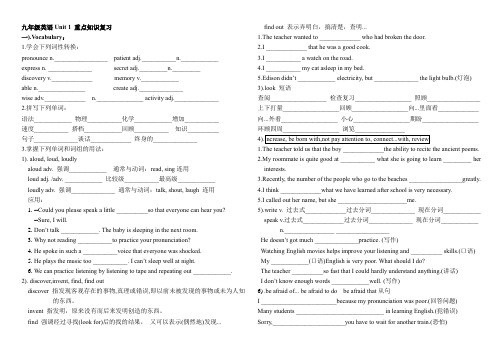
九年级英语Unit 1 重点知识复习一).Vocabulary:1.学会下列词性转换:pronounce n._________________ patient adj.___________n.____________ express n. ______________ secret adj._________n._________discovery v._____________ memory v.____________able n._______________ create adj.______________wise adv._____________ n._______________ activity adj.______________2.拼写下列单词:语法____________ 物理___________化学____________增加___________速度___________ 搭档____________回顾___________ 知识__________句子______________谈话_____________ 终身的______________3.掌握下列单词和词组的用法:1). aloud, loud, loudlyaloud adv. 强调____________ 通常与动词:read, sing连用loud adj. /adv. ____________ 比较级___________最高级____________loudly adv. 强调______________ 通常与动词:talk, shout, laugh 连用应用:1.--Could you please speak a little __________so that everyone can hear you?--Sure, I will.2.Don’t talk ____________. The baby is sleeping in the next room.3.Why not reading ___________to practice your pronunciation?4.He spoke in such a ___________voice that everyone was shocked.5.He plays the music too ___________. I can’t sleep well at night.6.We can practice listening by listening to tape and repeating out ____________. 2). discover,invent, find, find outdiscover 指发现客观存在的事物,真理或错误,即以前未被发现的事物或未为人知的东西。
九年级英语上册各单元知识点归纳

九年级英语上册各单元知识点归纳第一单元:基础知识1. 介词短语的使用:介词短语是由一个介词和它的宾语组成的短语,用来表示时间、地点、方向、原因等。
例如:"on the table"(在桌子上),"in the park"(在公园里)。
介词短语在句子中作状语、定语、宾语等。
需要注意介词与宾语之间的搭配。
2. 动词的时态和语态:英语中的动词有多种时态和语态。
常见的时态有一般现在时、一般过去时、一般将来时等。
常见的语态有主动语态和被动语态。
时态用于表示动作发生的时间,语态用于表示动作的执行者。
例如:"She is reading a book."(她正在读一本书)。
需要注意时态和语态的用法和变化规则。
3. 名词的单复数形式:英语中的名词有单数和复数形式。
复数形式一般是在名词后面加-s或-es。
有些名词的复数形式较特殊,需要记忆。
例如:"a cat"(一只猫)的复数形式是"cats"(多只猫)。
需要注意名词的单复数形式在句子中的搭配和用法。
第二单元:阅读理解1. 完型填空:完型填空是一种考察学生对语境理解和词汇运用能力的题型。
在完型填空中,通常给出一篇文章和一些空格,要求学生根据文章内容和语境选择正确的单词或短语填入空格中。
通常需要结合文章整体逻辑和上下文意义来填写正确答案。
2. 阅读理解题:阅读理解题是一种考察学生阅读理解能力和推理能力的题型。
通常会给出一篇短文或文章,然后根据文章内容提出一些问题,要求学生根据文章内容和推理来回答问题。
需要学会熟练阅读和理解文章,抓住关键信息和主题,并能运用推理等能力来回答问题。
第三单元:语法知识1. 直接引语和间接引语:在英语中,当我们引述别人的话时,可以使用直接引语和间接引语。
直接引语是直接引用别人所说的话,使用引号将其包围;间接引语是将别人所说的话转述出来。
例如:直接引语:"I am happy," she said.(她说:“我很开心。
九年级上册英语1-3单元总结知识点
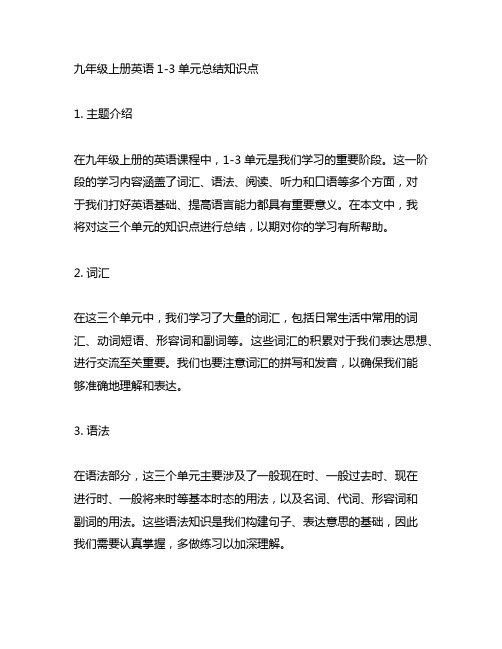
九年级上册英语1-3单元总结知识点1. 主题介绍在九年级上册的英语课程中,1-3单元是我们学习的重要阶段。
这一阶段的学习内容涵盖了词汇、语法、阅读、听力和口语等多个方面,对于我们打好英语基础、提高语言能力都具有重要意义。
在本文中,我将对这三个单元的知识点进行总结,以期对你的学习有所帮助。
2. 词汇在这三个单元中,我们学习了大量的词汇,包括日常生活中常用的词汇、动词短语、形容词和副词等。
这些词汇的积累对于我们表达思想、进行交流至关重要。
我们也要注意词汇的拼写和发音,以确保我们能够准确地理解和表达。
3. 语法在语法部分,这三个单元主要涉及了一般现在时、一般过去时、现在进行时、一般将来时等基本时态的用法,以及名词、代词、形容词和副词的用法。
这些语法知识是我们构建句子、表达意思的基础,因此我们需要认真掌握,多做练习以加深理解。
4. 阅读在阅读部分,我们学习了一些生活化的短文和对话,通过阅读可以了解不同文化背景下的思维方式和表达习惯。
阅读也可以帮助我们扩大词汇量、提高阅读理解能力,对于学习英语来说十分重要。
5. 听力和口语在这三个单元中,我们通过听力练习来提高我们的听力水平,通过模仿和练习来提高口语表达能力。
这对我们日常交流和英语考试都有很大的帮助,因此我们要多加练习,积极参与课堂讨论和口语练习。
总结回顾在这篇文章中,我对九年级上册英语1-3单元的知识点进行了总结。
这些知识点包括词汇、语法、阅读、听力和口语等多个方面,对于我们打好英语基础、提高语言能力都具有重要意义。
在学习过程中,我们不仅要掌握这些知识点,还要灵活运用、勤加练习,才能真正提高我们的英语水平。
个人观点和理解在学习英语的过程中,我觉得最重要的是坚持不懈地学习和练习。
只有通过不断地积累和实践,我们才能够真正掌握英语,运用自如。
另外,多听、多说、多读、多写也是提高英语能力的有效方法,希望大家能够坚持下去,不断进步。
结语通过对九年级上册英语1-3单元知识点的总结,相信大家对于这一阶段的学习有了更清晰的认识。
九年级英语u1到u3知识点
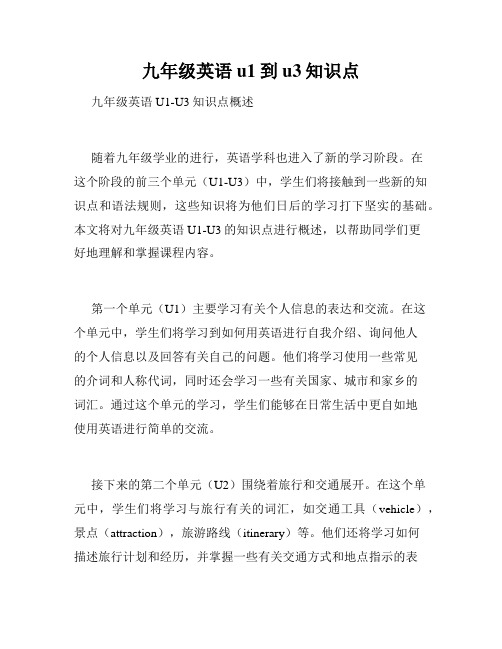
九年级英语u1到u3知识点九年级英语U1-U3知识点概述随着九年级学业的进行,英语学科也进入了新的学习阶段。
在这个阶段的前三个单元(U1-U3)中,学生们将接触到一些新的知识点和语法规则,这些知识将为他们日后的学习打下坚实的基础。
本文将对九年级英语U1-U3的知识点进行概述,以帮助同学们更好地理解和掌握课程内容。
第一个单元(U1)主要学习有关个人信息的表达和交流。
在这个单元中,学生们将学习到如何用英语进行自我介绍、询问他人的个人信息以及回答有关自己的问题。
他们将学习使用一些常见的介词和人称代词,同时还会学习一些有关国家、城市和家乡的词汇。
通过这个单元的学习,学生们能够在日常生活中更自如地使用英语进行简单的交流。
接下来的第二个单元(U2)围绕着旅行和交通展开。
在这个单元中,学生们将学习与旅行有关的词汇,如交通工具(vehicle),景点(attraction),旅游路线(itinerary)等。
他们还将学习如何描述旅行计划和经历,并掌握一些有关交通方式和地点指示的表达方式。
这个单元的学习将帮助学生们在未来的旅行中更加流利地与他人交流,并且能够更好地利用英语获取旅行信息和指导。
第三个单元(U3)侧重于学习与学校和学习有关的词汇和表达方式。
学生们将学习如何用英语描述他们的学校设施(facilities),教室(classroom),课程(curriculum)等,并能够询问他人的学校情况以及描述他们的学习经历。
此外,学生们还将学习一些有关学习方法和技巧的表达方式,提高他们在学习中的自我认识和学习能力。
除了以上三个单元中的具体知识点,这些单元还会涉及一些常见的英语语法和句型。
例如,在U1单元中,学生们将学习到一般现在时态的用法和一般过去时态的基本概念。
在U2单元中,他们将学习到一些描述位置和方向的介词用法,如in,on,at等。
在U3单元中,学生们将学习到一些基本的比较级和最高级的用法,以及how much和how many的区别。
九年级英语unit123的知识点
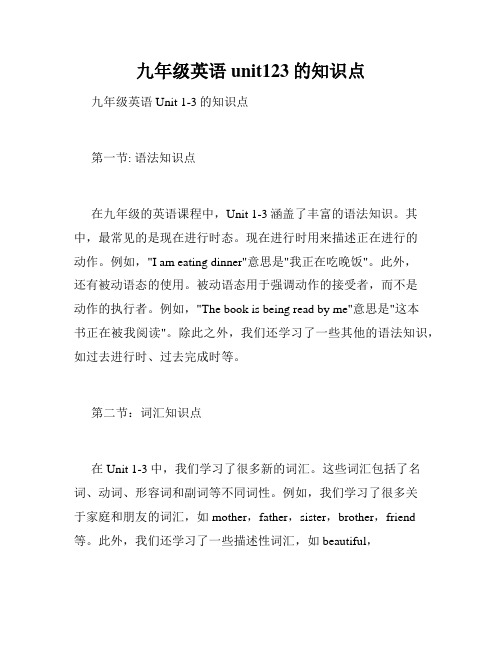
九年级英语unit123的知识点九年级英语Unit 1-3的知识点第一节: 语法知识点在九年级的英语课程中,Unit 1-3涵盖了丰富的语法知识。
其中,最常见的是现在进行时态。
现在进行时用来描述正在进行的动作。
例如,"I am eating dinner"意思是"我正在吃晚饭"。
此外,还有被动语态的使用。
被动语态用于强调动作的接受者,而不是动作的执行者。
例如,"The book is being read by me"意思是"这本书正在被我阅读"。
除此之外,我们还学习了一些其他的语法知识,如过去进行时、过去完成时等。
第二节:词汇知识点在Unit 1-3中,我们学习了很多新的词汇。
这些词汇包括了名词、动词、形容词和副词等不同词性。
例如,我们学习了很多关于家庭和朋友的词汇,如mother,father,sister,brother,friend 等。
此外,我们还学习了一些描述性词汇,如beautiful,interesting等。
通过学习这些词汇,我们能够更好地描述事物和人物。
第三节:阅读理解技巧阅读理解是英语学习中非常重要的一部分。
在Unit 1-3中,我们学会了一些有效的阅读理解技巧。
首先,我们要注重理解文章的主题句和段落大意。
通过抓住文章的重要信息,我们能够更好地理解文章的内容。
其次,我们要注意上下文的暗示和推测。
在阅读中,有时候我们需要通过上下文来推测一些词汇的意思。
最后,我们要善于使用词典和其他辅助工具来解决阅读中遇到的难点。
通过不断的阅读和练习,我们的阅读理解能力会不断提高。
第四节:听力技巧在九年级的英语学习中,我们还要提高我们的听力技巧。
在Unit 1-3中,我们学习了一些有关听力的技巧。
首先,我们要注意抓住关键词。
当我们听到关键词时,应该立即将其与自己已有的知识联系起来,以便更好地理解整个句子的含义。
第二,我们要注意上下文的线索。
九年级英语1-3单元知识点

九年级英语1-3单元知识点Unit 1 How can we become good learners?One important point is about vocabulary. We need to learn new words all the time. For example, we can use flashcards. Write the word on one side and the meaning or a sentence with it on the other side. It's a really useful way to remember words. Also, reading a lot helps us meet new words in different contexts. When we see a new word many times, it's easier to remember it.Listening skills are also crucial. We can listen to English podcasts or English songs. Try to understand the main idea at first. Don't worry too much if we can't catch every word. Just keep listening. And we can imitate what we hear. It can improve our pronunciation as well as our listening ability.Another aspect is grammar. It might seem a bit difficult at times. But we can learn grammar rules through examples. For instance, when we study the present perfect tense, we can look at a lot of sentences using this tense. Then we can practice making our own sentences following the rules.Unit 2 I think that mooncakes are delicious!Festivals play a big role in this unit. There are various festivals around the world. Take the Mid - Autumn Festival in China for example. People usually get together, eat mooncakes and admire the full moon. Mooncakes come in different flavors like lotus seed paste, red bean paste and so on.When it comes to cultural traditions, they are very interesting. In some Western festivals, like Christmas, people decorate Christmas trees andgive presents to each other. These traditions have been passed down for a long time and they are important parts of the cultures.Talking about food in festivals is always fun. Different festivals have their own special foods. In the Dragon Boat Festival, we have zongzi. It's made of glutinous rice and often has fillings like meat or dates. These festival foods not only taste good but also carry cultural meanings.Unit 3 Could you please tell me where the restrooms are?Asking for directions is a key part. We need to use polite expressions. For example, “Could you please tell me...?” is much more polite than just “Where is...?” When we are in a new place and we want to find a placelike a restroom or a bookstore, we should use these polite ways to ask.There are different kinds of places we might need to find. Shopping malls usually have signs to show where different stores and facilities are. But in some old towns or small streets, we may have to ask local people. They can give us very useful information.We also need to understand some basic prepositions of place when asking for directions. For example, “next to”, “across from”,“between...and...”. If we know these well, it will be easier for us to understand the directions that others give us.。
人教版九年级英语期末 Unit 1-3 复习
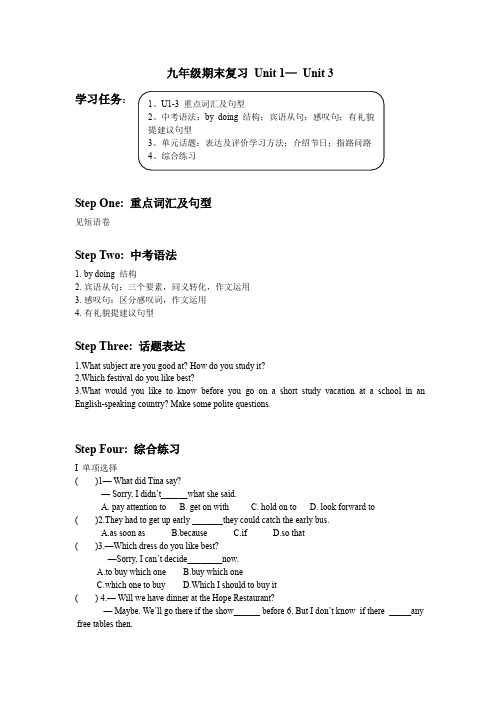
九年级期末复习 Unit 1— Unit 3学习任务:Step One: 重点词汇及句型见短语卷Step Two: 中考语法1. by doing 结构2. 宾语从句:三个要素,同义转化,作文运用3. 感叹句:区分感叹词,作文运用4. 有礼貌提建议句型Step Three: 话题表达1.What subject are you good at? How do you study it?2.Which festival do you like best?3.What would you like to know before you go on a short study vacation at a school in an English-speaking country? Make some polite questions.Step Four: 综合练习I 单项选择( )1— What did Tina say?— Sorry, I didn’t ______what she said.A. pay attention toB. get on withC. hold on toD. look forward to( )2.They had to get up early _______they could catch the early bus.A.as soon asB.becauseC.ifD.so that( )3.—Which dress do you like best?—Sorry, I can’t decide________now.A.to buy which oneB.buy which oneC.which one to buyD.Which I should to buy it( ) 4.— Will we have dinner at the Hope Restaurant?— Maybe. We’ll go there if the show______ before 6. But I don’t know if there _____any free tables then.1、U1-3 重点词汇及句型2、中考语法:by doing 结构;宾语从句;感叹句;有礼貌提建议句型3、单元话题:表达及评价学习方法;介绍节日;指路问路4、综合练习A. will end; wereB. will end; will beC. ends; wereD. ends; will be ( ) 5.— Why not listen to BBC news to improve your listening skills?—It’s _______ difficult for me ____ follow.A. too; toB. so; thatC. such; thatD. so; too( ) 6.-- Peter has changed a lot, hasn’t he ?-- Yes, He used to _______ the guitar, but now he is more _____ in playing soccer .A. plays; interestedB. play interestedC. play interestingD. playing; interest ( ) 7.We will have two family parties this autumn. One is at Halloween and ________is Thanksgiving.A. otherB. the otherC. anotherD. the others( ) 8.—“ Where is your father?”—“He _____ Shanghai on business.”A. has been toB. has gone toC. has been inD. has been at( ) 9. I saw so many books in the shelves, and I didn’t know _____.A. which to chooseB. What to chooseC. where to chooseD. when to choose ( )10.— Can you spare time to come to our Thanksgiving party?— Well, I don’t know ____A. that I can finish my work by thenB. if can I finish the work by thenC. whether I can finish the work by thenD. that can I finish the work by then( )11.—What do you think of Mr. Green ?--- I find _________ difficult to work with him.A. thisB. themC. itD. That( ) 12.__________ clever the boy is!A. HowB. WhatC. What aD.How a( ) 13-- How do you study _____a test?-- I study _______working with a group.A. for, in,B. for, by,C. for, by,D. of, in,( ) 14.--When were you born?—I was born ______the morning of September 28,1999.A. inB. withC. atD. on( )15.— We will have a 7-day holiday from Oct.1 to Oct.7 for our Chinese National Day?— Wow, _______ exciting news it is!.A. WhatB. What anC. HowD. How an( )16.Jimmy is very helpful.______I stay with him,________I like him.A. The longer; the mostB. The longest; the mostC. The longer; the moreD. The longest; the more( )17. — ______will the supper be ready?---In a minute.A. How longB. How oftenC. How soonD. How much( )18.The expressions they use might_______whom they are speaking to or how wellthey know each other.A.instead ofB.lead in toC.because ofD.depend on( ) 19. ______ the English club at school is the best way to improve our English.A. JoinB. JoinedC. JoiningD. Joins( )20.I wonder _______ you would like to come to my birthday party .A .that B. whether C .that whether D . that if( )21.What is the matter? I have trouble ____ who has taken my book.A looking afterB finding outC to find outD to look up( )22..I’ve _____five pounds because I ate too much meat.A.put upB.put offC.put awayD.put on( )23.— Does my question sound ______enough?— I don’t think so. You can ask more________by using extra words.A. politely; politelyB. politely; politeC. polite; politelyD. polite; polite( )24.__________that they haven‟t known the news.A It seemsB It seemedC They seemD They seemed( )25. The small boys decided ______ to each other.A. not talkB. not talkingC. not to talkD.talkingII 综合填空A.用所给词的适当形式填空,每词限用一次。
初三英语Unit1--3知识点复习一

知识点总复习一
复习要点介绍
单词的词性词型变化
重要的词组短语 固定句型
Unit One
一、词型变化 1.pronounce ----n._______________
3.memorize--n.____________ 4.create---adj.___________
二、词组短语
Section A 1.向某人求助 2.同某人谈话 3. ...太......而不能...... 4.朗读 6.英语口语 8.读完一本书 10.at first 11.一个词一个词地读 12.耐心点
5.口语技能 7.that way 9.作报告
13. ......的秘密/秘诀 14.害怕做某事 15.爱上.... 16. 肢体语言 17.as well 18.查阅;查找 19.一部叫玩具总动员的英语电影 20.listen for 21.have a better understanding of ....
3. 大声朗读可以帮你培养语感。
______________can help you develop a sense of language. 4. 我第一次见到她时,就就喜欢上了她。 I ______________with her when I met her for the first time.
5. 你读书快慢主要取决于你的词汇量和阅读习惯。
Whether or not you read fast mainly _________ your vocabulary and reading habits.
三、固定句型
1.by doing sth 2.What about doing sth?
九年级英语一到三单元知识点

九年级英语一到三单元知识点Unit 1 How can we become good learners?一、重点单词。
1. textbook (n.) 教科书;课本。
2. conversation (n.) 交谈;谈话,常用于短语“have a conversation with sb.”(与某人交谈)3. aloud (adv.) 大声地;出声地。
区别于“loud”(adj. 大声的,常用来修饰名词,如a loud voice)和“loudly”(adv. 喧闹地,侧重于嘈杂、喧闹的声音)。
例如:Read aloud to practice pronunciation.(大声朗读来练习发音。
)4. pronunciation (n.) 发音;读音。
例如:His pronunciation is very good.(他的发音很好。
)5. sentence (n.) 句子。
6. patient (adj.) 有耐心的;n. 病人。
常用搭配“be patient with sb.”(对某人有耐心)。
例如:Our teacher is patient with us.(我们的老师对我们很有耐心。
)7. expression (n.) 表达(方式);表示;表情。
例如:Facial expressions can show our feelings.(面部表情能展示我们的情感。
)二、重点短语。
1. make word cards 制作单词卡片。
2. listen to tapes 听磁带。
3. ask the teacher for help 向老师求助。
4. read aloud 大声朗读。
5. have conversations with 与……交谈。
6. give a report 作报告。
7. word by word 逐字地。
8. the secret to... ……的秘诀。
例如:The secret to success is hard work.(成功的秘诀是努力工作。
九年级英语1-3单元知识点总结

九年级英语1-3单元知识点总结(总32页)--本页仅作为文档封面,使用时请直接删除即可----内页可以根据需求调整合适字体及大小--Unit 1一、知识点in : 在旅馆的登记入住。
Check out: 在旅馆结账离开。
: ①通过…..方式(途径)。
例:I learn English by listening to tapes.②在…..旁边。
例:by the window/the door③乘坐交通工具例:by bus/car④在……之前,到……为止。
例:by October在10月前⑤被例:English is spoken by many people.与what的区别:how通常对方式或程度提问,意思有:怎么样如何,通常用来做状语、表语。
what通常对动作的发出者或接受者提问,意思为什么,通常做宾语,主语。
①How is your summer holiday? It’s OK.(how表示程度做表语)②How did you travel around the world? I travel by air.③What do you learn at school? I learn English, math and many other subjects.①What…think of…How…like…②What…do with…How…deal with…③What…like about… How…like…④What’s the weather like today How’s the weather today⑤What to do How to do it. What do you think of this book=How do you like this bookI don’t know what I should do with the matter.=I don’t know how I should deal with it.What do you like about China=How do you like ChinaI don’t know what to do next step=I don’tknow how to do it next step㊣What good / bad weather it is today!(weather为不可数名词,其前不能加 a )㊣What a fine / bad day it is today! (day为可数名词,其前要加 a )4. aloud, loud与loudly的用法 : 三个词都与"大声"或"响亮"有关。
九年级英语unit1 3a知识点总结

1)We are not afraid of any difficulties. 我们不害怕任何困难。
2) I work hard because I’m afraid of losing the job. 我努力工作因为我害怕丢掉这份工作。
3) Don’t be afraid to ask for help. 不要怕求人帮忙。
--Are we late?
--I’ afraid not.
--I’m afraid so.
我们准时吗?恐怕不准时。 我们迟到了吗?恐怕是这样的。
3. My pronunciation improved as well by listening to the conversations in English movies.
爱迪生没有发现电能,但是发明了电灯泡。
I found a watch on the road.
我在街道上找到了一块手表。
I looked for my cat all day ,but I couldn’t find it anywhere.
我全天都在寻找我的猫,但我在哪都没有找到。
The teacher wanted to find out who cheated in the last exam.
【活学活用】 1) I found him _t_a_lk_i_n_g_ (talk) with his partner when I saw him. 2) I found it hard for me _t_o__im__p_r_o_v_e_ (improve) my spoken English. 3)My pen pal Andrew found ____ difficult to learn Chinese well.
初三一到三单元英语知识点
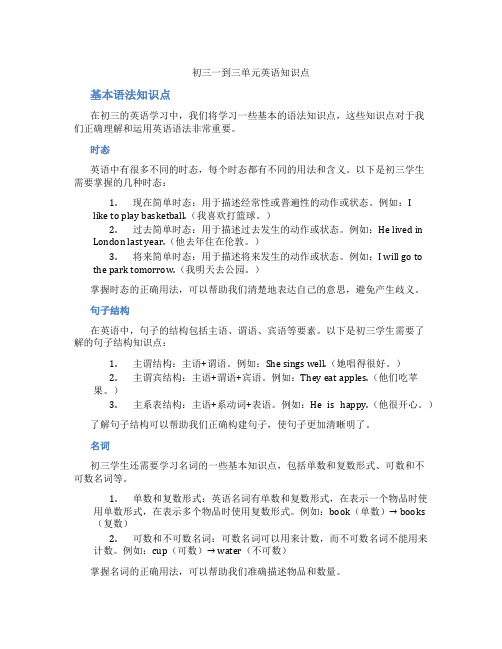
初三一到三单元英语知识点基本语法知识点在初三的英语学习中,我们将学习一些基本的语法知识点,这些知识点对于我们正确理解和运用英语语法非常重要。
时态英语中有很多不同的时态,每个时态都有不同的用法和含义。
以下是初三学生需要掌握的几种时态:1.现在简单时态:用于描述经常性或普遍性的动作或状态。
例如:Ilike to play basketball.(我喜欢打篮球。
)2.过去简单时态:用于描述过去发生的动作或状态。
例如:He lived inLondon last year.(他去年住在伦敦。
)3.将来简单时态:用于描述将来发生的动作或状态。
例如:I will go tothe park tomorrow.(我明天去公园。
)掌握时态的正确用法,可以帮助我们清楚地表达自己的意思,避免产生歧义。
句子结构在英语中,句子的结构包括主语、谓语、宾语等要素。
以下是初三学生需要了解的句子结构知识点:1.主谓结构:主语+谓语。
例如:She sings well.(她唱得很好。
)2.主谓宾结构:主语+谓语+宾语。
例如:They eat apples.(他们吃苹果。
)3.主系表结构:主语+系动词+表语。
例如:He is happy.(他很开心。
)了解句子结构可以帮助我们正确构建句子,使句子更加清晰明了。
名词初三学生还需要学习名词的一些基本知识点,包括单数和复数形式、可数和不可数名词等。
1.单数和复数形式:英语名词有单数和复数形式,在表示一个物品时使用单数形式,在表示多个物品时使用复数形式。
例如:book(单数)→ books (复数)2.可数和不可数名词:可数名词可以用来计数,而不可数名词不能用来计数。
例如:cup(可数)→ water(不可数)掌握名词的正确用法,可以帮助我们准确描述物品和数量。
阅读技巧初三的英语学习中,我们也需要掌握一些阅读技巧,这可以帮助我们更好地理解和记忆所读的内容。
理解上下文在阅读时,我们需要注意上下文,通过前后句子的关系来理解词汇和句子的含义。
英语九上1~3单元知识点
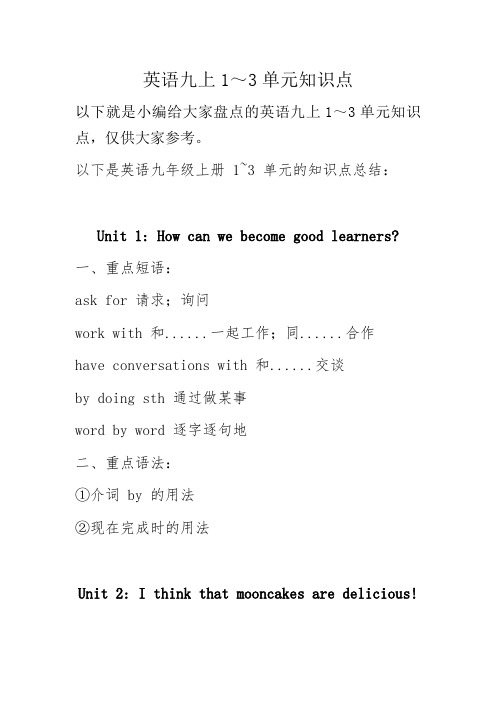
英语九上1~3单元知识点
以下就是小编给大家盘点的英语九上1~3单元知识点,仅供大家参考。
以下是英语九年级上册1~3单元的知识点总结:
Unit1:How can we become good learners?一、重点短语:
ask for请求;询问
work with和......一起工作;同......合作
have conversations with和......交谈
by doing sth通过做某事
word by word逐字逐句地
二、重点语法:
①介词by的用法
②现在完成时的用法
Unit2:I think that mooncakes are delicious!
the Water Festival泼水节
the Dragon Boat Festival端午节
the Spring Festival春节
the Lantern Festival元宵节
eat out出去吃饭
二、重点语法:
①宾语从句的用法
②感叹句的用法
Unit3:Could you please tell me where the
restrooms are?
一、重点短语:
on your right在你的右边
turn left向左拐
between...and...在......和......之间pardon me对不起;请原谅
come on快点儿
①问路与指路的表达方式
②形容词的用法
以上这些只是一些重点知识点的总结,你可以根据自己的需求进行更详细的学习。
九年级英语1至3知识点

九年级英语1至3知识点1. 语法知识点在九年级英语中,学生将进一步巩固和扩展所学的语法知识。
以下是一些重要的语法知识点:主谓一致:主语与谓语在人称和数上要保持一致。
例如:He likes to play basketball.(他喜欢打篮球。
)动词时态:学生需要学会运用时态,包括一般现在时、一般过去时、一般将来时等。
例如:She is studying for the exam.(她正在备考。
)被动语态:学生需要理解被动语态的构成和使用,例如:The book was written by a famous author. (这本书是由一位著名的作者写的。
)比较级和最高级:学生需要掌握形容词和副词的比较级和最高级形式的构成和使用。
例如:This book is more interesting than that one.(这本书比那本书更有趣。
)条件句:学生需要学会使用条件句表达假设和结果之间的关系。
例如:If I have time, I will go shopping.(如果我有时间,我将去购物。
)名词性从句:学生需要了解名词性从句的用法和结构,例如:I know that he is a doctor.(我知道他是个医生。
)2. 词汇知识点除了掌握基本的词汇外,九年级学生还需要学习一些更高级的词汇和短语。
形容词和副词:学生需要扩展词汇量,掌握更多形容词和副词的用法。
例如:beautiful, amazing, carefully, quickly等。
介词短语:学生需要学会运用介词短语来描述位置、时间和方式等。
例如:in front of, at the end of, by bus等。
固定搭配和习惯用语:学生需要学会一些常用的固定搭配和习惯用语,以丰富表达能力。
例如:take care, on the other hand, as a matter of fact等。
3. 阅读技巧在九年级英语中,学生将接触到更多的阅读材料,因此需要掌握一些阅读技巧。
九年级英语1-3单元知识归纳
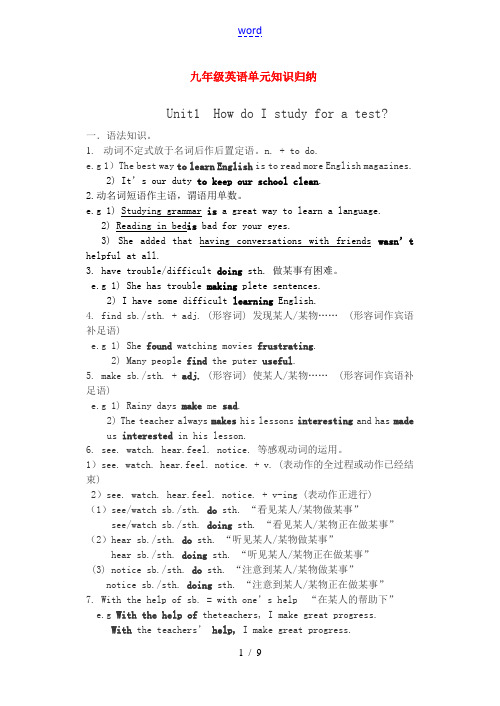
九年级英语单元知识归纳Unit1 How do I study for a test?一.语法知识。
1.动词不定式放于名词后作后置定语。
n. + to do.e.g 1)The best way to learn English is to read more English magazines.2) It’s our duty to keep our school clean.2.动名词短语作主语,谓语用单数。
e.g 1) Studying grammar is a great way to learn a language.2) Reading in bed is bad for your eyes.3) She added that having conversations with friends wasn’t helpful at all.3. have trouble/difficult doing sth. 做某事有困难。
e.g 1) She has trouble making plete sentences.2) I have some difficult learning English.4. find sb./sth. + adj. (形容词) 发现某人/某物…… (形容词作宾语补足语)e.g 1) She found watching movies frustrating.2) Many people find the puter useful.5. make sb./sth. + adj. (形容词) 使某人/某物…… (形容词作宾语补足语)e.g 1) Rainy days make me sad.2) The teacher always makes his lessons interesting and has madeus interested in his lesson.6. see. watch. hear.feel. notice. 等感观动词的运用。
九年级英语U1-3重点知识梳理
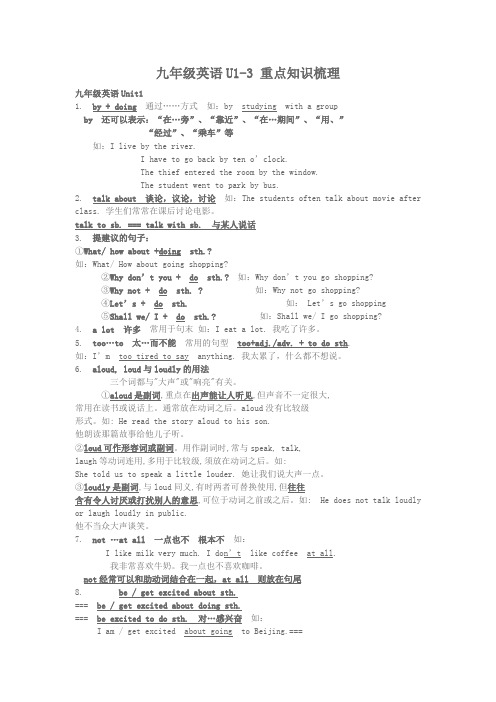
九年级英语U1-3 重点知识梳理九年级英语Unit11. by + doing通过……方式如:by studying with a groupby 还可以表示:“在…旁”、“靠近”、“在…期间”、“用、”“经过”、“乘车”等如:I live by the river.I have to go back by ten o’clock.The thief entered the room by the window.The student went to park by bus.2. talk about 谈论,议论,讨论如:The students often talk about movie after class. 学生们常常在课后讨论电影。
talk to sb. === talk with sb. 与某人说话3. 提建议的句子:①What/ how about +doing sth.?如:What/ How about going shopping?②Why don’t you + do sth.?如:Why don’t you go shopping?③Why not + do sth. ? 如:Why not go shopping?④Let’s + do sth. 如: Let’s go shopping⑤Shall we/ I + do sth.?如:Shall we/ I go shopping?4. a lot 许多常用于句末如:I eat a lot. 我吃了许多。
5. too…to 太…而不能常用的句型too+adj./adv. + to do sth.如:I’m too tired to say anything. 我太累了,什么都不想说。
6. aloud, loud与loudly的用法三个词都与"大声"或"响亮"有关。
①aloud是副词,重点在出声能让人听见,但声音不一定很大,常用在读书或说话上。
九年级上册英语一至三单元知识点总结
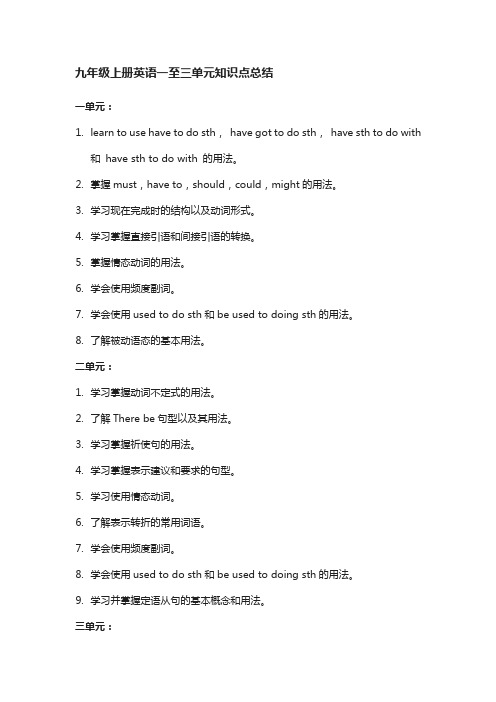
九年级上册英语一至三单元知识点总结
一单元:
1.learn to use have to do sth,have got to do sth,have sth to do with
和have sth to do with 的用法。
2.掌握must,have to,should,could,might的用法。
3.学习现在完成时的结构以及动词形式。
4.学习掌握直接引语和间接引语的转换。
5.掌握情态动词的用法。
6.学会使用频度副词。
7.学会使用used to do sth和be used to doing sth的用法。
8.了解被动语态的基本用法。
二单元:
1.学习掌握动词不定式的用法。
2.了解There be句型以及其用法。
3.学习掌握祈使句的用法。
4.学习掌握表示建议和要求的句型。
5.学习使用情态动词。
6.了解表示转折的常用词语。
7.学会使用频度副词。
8.学会使用used to do sth和be used to doing sth的用法。
9.学习并掌握定语从句的基本概念和用法。
三单元:
1.学习掌握过去进行时的用法。
2.学习掌握过去完成时的用法。
3.学习掌握现在完成进行时的用法。
4.学习掌握现在完成时的被动语态用法。
5.学习掌握情态动词的完成式用法。
Units1-3单元重要知识点+2023-2024学年人教版九年级英语全册

1-3单元重要知识点1单元1.pron ou nc e(v)---pron u nc i ation(n)2.able(v)--ability(n)3.Know(v)--know ledge(n)4.wise(adj)--wise ly(adv) nice(adj)— nice ly(adv)5.by doing sth6.the +比较级.....,the +比较级..... 表示越…..,越…..7.a boy called...(过去分词做定语)8.be afraid to do sth/ be afraid of doing sth9.be interested in....../doing sth10.It’s not enough to do sth 做某事是不够的11.practice doing sth /spend….doing sth/finish doing sth /keep doing sth/avoid doing sth12.It’s + 形容词+ to do sth13.try to do sth /need to do sth14.I don’t know what to learn./I don’t know how to increase my reading speed特殊疑问词+ to do 不定式做宾语15.so….that (跟句子)/ too….to …..(to 后面跟动词原形)16.be afraid of doing / be afraid to do sth17.a cook called Tom (called 过去分词做定语)18.fall in love with19.look up 查阅look it up/look them up (代词放动词短语中间)20.I can’t understand spoken English.21.How can you become a successful learners? success(n)---success ful(adj)22.depend on 依靠,依赖23.be interested in (doing) sth对…感兴趣24.connect….with 和….联系25.unless 除非,如果不/ not….until 直到……才….26.succeed by doing sth 通过做某事成功2单元1.strange(adj)----strang er(n)2.steal(v)---stole---stoleny(v)---laid---laid 放置,安放,产卵,下蛋lay out 摆放,放置4.lie(v)--lay--lain 存在,平躺,处于5.die(v)---dead(adj)----death(n)6.bus y(adj)----bus iness shy(adj) ---shy ness7.warm(adj)---warm th(n)8.tradition(n)--tradition al(adj)9.refuse to do sth/decide to do sth/need to do sth10.play a trick on sb11.give sb a treat12.promise to do sth13.warn sb (not) to do sth14.end up with15.I wonder if there is a school near here.16.I wonder if they will have Zongzi again next year.17.I’ve put on five pounds. put on增加,发胖18.I wonder if…….19.They go on the streets to throw water at each other. to do 不定式表示目的20. It’s the most touching.感动人的touch----touching21.plan to do sth/ try to do sth/refuse to do sth/ decide to do sth/ promise to do sth22.I know/believe that…..23.感叹句:What + 形容词+ 名词+ (主语+谓语。
人教版初三英语Unit1-3知识点总结

初三Unit1-Unit3基础知识点汇总I. 单词知识点总结:1.suggest doing sth. 建议做某事advise sb. (not ) to do sth. 建议某人做(不做)某事2.warn sb. (not ) to do sth. 警告某人做(不做)某事3.admire sb. for sth. 羡慕某人......4.be dead 死(的状态)dying adj. 即将死的5.spread v. 传播6.speed n. 速度7.convenient adj. 方便的8.patient adj. 有耐心的 n. 病人 be patient with sb 对某人有耐心9.pronounce v.发音 pronunciation n. 发音10.warm adj. 暖和 warmth n. 暖和11.repeat v. 重复12.mind doing sth.介意做某事13.punish sb. for sth. 因某事而惩罚14.tradition n. 传统 traditional adj. 传统的15.express v. 表达 expression n. 表情16.expensive adj. 昂贵的 inexpensive不昂贵的17.polite adj. 有礼貌的 politely adv. 有礼貌地,18.crowd n. 人群,crowded adj, 拥挤的 uncrowded adj. 不拥挤的19.stranger n. 陌生人,strange adj. 奇怪的20.steal v. 偷 stole stolenII. 短语take notes 做笔记look up 查阅;抬头看keep a diary 记日记listen to tapes 听录音磁带pay attention to sth. / doing sth. 注意某事word by word 逐字逐句have conversations with 与某人交谈give a report 做报告be born with 天生具有make a mistake 犯错误be afraid of sth. / be afraid to do sth. 害怕做某事warn sb. (not) to do sth. 警告某人(不)做某事put on 增加(体重);发胖lay out 摆开;布置end up 最终成为;最后处于Mid-Autumn Festival 中秋节be similar to 与……相似dress up 装扮;穿上盛装remind sb. of 使某人想起in need 有需要的shoot down 射下pass by 经过communicate…with与……交流ask…for help向……寻求帮助on one’s way to…在去……的路上walk up to…朝……走去between…and…在……和……之间in different situations 在不同的情况下on one’s right/ left 在某人的左/右边Unit1 How can we become good learners?【重点句型】提建议的句子:① What/ how about +doing sth.? 做…怎么样?如:What/ How about going shopping?② Why don't you + do sth.? 你为什么不做…?如:Why don't you go shopping?③ Why not + do sth. ? 为什么不做…?如:Why not go shopping?④ Let's + do sth. 让我们做…吧。
九年级英语1-3单元知识点人教版

九年级英语1-3单元知识点人教版Unit 1 How can we become good learners?一、重点单词。
1. textbook:n. 教科书;课本。
2. conversation:n. 交谈;谈话。
3. aloud:adv. 大声地;出声地(区别于loud,loud可作形容词或副词,侧重声音响亮;aloud强调出声,能让人听见)4. pronunciation:n. 发音;读音。
5. sentence:n. 句子。
6. patient:adj. 有耐心的;n. 病人(be patient with sb. 对某人有耐心)7. expression:n. 表达(方式);表示。
8. discover:v. 发现;发觉(指发现原本存在但不为人知的事物)9. secret:n. 秘密;秘诀;adj. 秘密的;保密的(the secret to... ……的秘诀)10. look up:查阅;抬头看(look up a word in the dictionary在字典里查单词)二、重点短语。
1. by working with friends:通过和朋友一起学习。
2. make word cards:制作单词卡片。
3. read aloud:大声朗读。
4. practice doing sth.:练习做某事。
5. be afraid to do sth.:害怕做某事(be afraid of doing sth. 担心会发生某事)6. fall in love with:爱上;与……相爱。
7. as well:也(用于肯定句末,相当于too)8. look up to:钦佩;仰慕。
9. take notes:记笔记。
10. make mistakes in:在……方面犯错误。
三、重点句型。
1. How do you study for a test? 你如何为考试而学习?- I study by listening to tapes. 我通过听磁带学习。
- 1、下载文档前请自行甄别文档内容的完整性,平台不提供额外的编辑、内容补充、找答案等附加服务。
- 2、"仅部分预览"的文档,不可在线预览部分如存在完整性等问题,可反馈申请退款(可完整预览的文档不适用该条件!)。
- 3、如文档侵犯您的权益,请联系客服反馈,我们会尽快为您处理(人工客服工作时间:9:00-18:30)。
九年级英语期末复习Unit1-Unit3
Unit1n. 1 教科书__________2 交谈,谈话__________ 3 发音,读音__________4 句子__________ 5 病人__________ 6 表情表达__________ 7 秘密,秘诀__________ 8 语法__________ 9 笔记,记录__________10 朋友伙伴__________11 物理__________12 化学__________ 13 模式,方式__________14 速度__________15 搭档,同伴__________ 16 能力,才能__________17 大脑__________18 注意,关注__________19 回顾复习__________ 20 知识,学问__________
Adj. 1有耐心的__________2 秘密的,保密的__________ 3 天生的__________4 活跃的积极地__________5 终身的,毕生的__________
Adv. 1 大声地,出声地__________2 一夜之间__________3 明智地__________
v. 写出原形过去式过去分词1 发现,发觉______________________________ 2 重复,重做__________ 3 记忆,记住__________4 发音__________ 5 增长,增加__________ 6 出生__________7 创造__________8 连接,与…有联系__________ 9 复习__________
词组句子:1 查阅,抬头看__________ 2 天生具有______________ 3 注意,关注_______________ 4 把…和…联系起来______________5 听磁带________________ 6 向老师求助_______________7 为考试学习________________8 和…交谈________________9 大声阅读________________10 大声重复出来________________ 11 读完一本书________________ 12 一个单词一个单词地读_______________________13 通过阅读前后文的句子________________________________14 耐心点________________15 你读得越多你就读的越快________________________________16 发现学英语很困难________________ 17 害怕做某事________________________________ 18 爱上________________ 19 我发现听一些有趣的东西是英语学习的秘诀所在________________________________________________20 在字典中查阅他们________________ 21 对英语电影有一个更好的理解________________________________22 做笔记________________ 23 写英语日记________________ 24 增加阅读速度________________25 取决于,依赖于________________ 26 对…感兴趣________________ 27 例如________________28 如果不用它就会忘记它________________________________ 29 向…解释…________________30 知识来源于质疑________________________________ 31 明智的学习________________
Unit2 n. 1 月饼__________ 2 灯笼__________3 陌生人__________4 亲戚__________5 磅英镑__________ 6 女神__________7 甜点__________ 8 花园__________ 9 传__________ 10 领带__________ 11 鬼魂__________ 12 花招把戏__________ 13 款待,招待__________ 14 蜘蛛__________15 圣诞节__________16 小说__________ 17 前夕__________ 18 生意,商业__________ 19 现在,礼物__________ 20 温暖__________21 蔓延传播__________ Adj. 1 民间的民俗的__________2 闹鬼的__________ 3 死的失去生命的__________4 现在的__________
v. 写出原形过去式过去分词 1 偷窃________ ________ ________2 放置,产卵________________________ 3 欣赏,仰慕________________________ 4 捆束_______ _______ ______ 5 存在平躺处于______ ______ _______6 招待________ ________ _______ 7 处罚惩罚________ ________ _______ 8 警告告诫________ ________ _______9 传播展开________ ________ _______
词组句子:1 穿上发胖________________2 摆开布置________________ 3 最终成为________________ 4 和…相似________________ 5 呈现…的形状________________ 6 在中秋节的晚上________________ 7 射下________________8 拒绝做…________________9 飞
到月亮上________________10 他多么希望嫦娥能够回来________________________________ 11 赏月以及和家人一起分享月饼的传统________________________________12 泼水节是多麽有趣的事情啊________________ 13 开某人的玩笑________________14 打扮成为________________ 15 …的重要性________________16 有狄更斯写的一部著名的短片小说________________________________ 17 关心在意________________18 警告某人干某事________________19 向他一样告终________________ 20 让某人想起________________ 21 许诺成为一个更好的人________________________________ 22 把礼物给需要的人________________ 23 用善良和温暖对待每一个人________________________________ Unit3 n. 1 (美)洗手间公共厕所__________2 邮票印章__________ 3 书店__________ 4 明信片__________ 5 洗手间厕所__________6 浴室洗手间__________7 仓促急促__________ 8 职工__________ 9 葡萄__________ 10 邮件信件__________ 11 东方__________ 12 商场__________ 13 职员__________14 拐角角落__________15 要求请求__________ 16 方位方向__________17 发言者说某种语言的人__________ 18 住址地址__________19 课程学科__________20 地铁__________
Adj. 1 中心的中央的__________2 附近的__________ 3 东方的东部的__________ 4 迷人的极有吸引力的__________5 不昂贵的__________ 6 不拥挤的__________ 7 便利的__________ 8 正确的,恰当的__________9 有礼貌的__________10 没有礼貌的__________ 11 直接的__________ 12 地下的__________
Adv. 1 通常正常情况下__________ 2 在附近附近__________3 向东朝东__________4 有礼貌的__________
Prep 1 在…旁边在…附近__________
v. 1 仓促急促__________ 2 建议提议__________ 3 要求请求__________
词组句子 1 路过经过________________2 抱歉对不起________________ 3 停车场________________4 沿主街一直走________________5 在你的右边________________ 6 你知道书店几点关门吗________________ 7左转________________ 8 经过书店________________ 9 你不需要着急________________10 不尝试你就永远不知道________________ 11 在某人去…的路上________________ 12 经过Bob叔叔的店________________ 13 走向一个职员________________14 忙于干某事________________15 有礼貌的求助________________16 在不同的情况下________________ 17 花时间导入一个请求________________18 和其他的人更好的交流________________
语法宾语从句四要素__________ __________ __________ __________。
